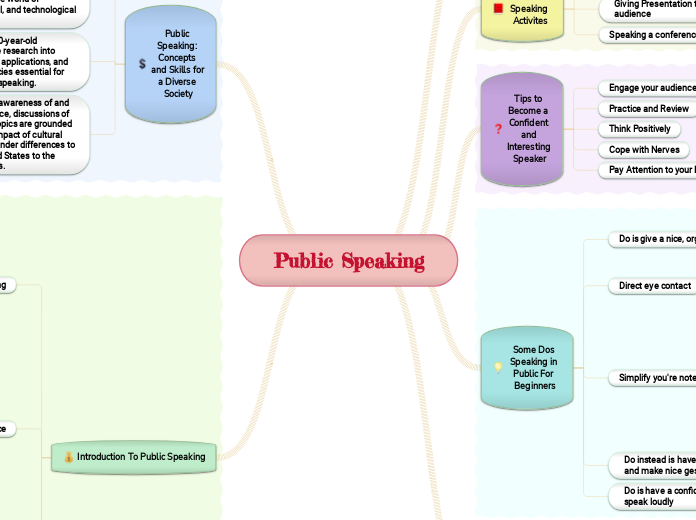Public Speaking
The Meaning of Public Speaking
Public Speaking is speak in front of an audiences.
Public Speaking Activites
CO - workers
Giving Presentation to customers or audience
Speaking a conference
Tips to Become a Confident and Interesting Speaker
Engage your audience members
Practice and Review
Think Positively
Cope with Nerves
Pay Attention to your Body Language
Some Dos Speaking in Public For Beginners
Do is give a nice, organized, and concise
You have to take your time beforehand when you're preparing to create a nice introduction, body, and conclusion.
Direct eye contact
Look directly into person's eye long enough to finish.
Simplify you're notes
So that you can just have a conversational style with your audience, and again, as you're practicing, you have to whittle down those notes so that all you have are talking points, like a little grocery list of items that you're going to talk about, and it almost forces you, or at least frees you, to connect with people, to look up, and to have a nice normal conversation with them and your natural personality.
Do instead is have a nice, confident posture and make nice gestures
Do is have a confident voice where you speak loudly
Some don'ts Speaking in Public For Beginners
Don’t ramble and get long-winded
Don’t look with your eyes in the wrong place or make bad eye contact
Don’t clutter your notes
Don’t want to load up your slide or complex slides
Don’t Fidget
Don’t speak too softly & Fillers
Public Speaking: Concepts and Skills for a Diverse Society
Public speaking concepts and skills for a diverse society, 80 equips you with the training and tools to be an effective public speaker and listener in the world of constant cultural, political, and technological changes.
The book combines 2,500-year-old principles with up-to-date research into concepts, skills, theories, applications, and critical thinking proficiencies essential for successful listening and speaking.
Giving you a heightened awareness of and sensitivity to your audience, discussions of classic public speaking topics are grounded in an awareness of the impact of cultural nuances ranging from gender differences to cultures within the United States to the traditions of other nations.
Introduction To Public Speaking
The Tradition of Public Speaking
Given the importance of public speaking, it's not surprising that it has been taught and studied around the globe for thousands of years. Almost all cultures have an equivalent of the English word "orator" to designate someone with special skills in public speaking. The oldest known handbook on effective speech was written on papyrus in Egypt some 4500 years ago. In classical Greece and Rome, public speaking played a central role in education and civic life.
Analyzing The Audience
Good speakers are audience-centered. To be an effective speaker, you should know something about the psychology of audiences. The first stage in learning about your audience is to undertake a demographic audience analysis.The second stage in learning about your audience is to conduct a situational audience analysis.
Developing Confidence
Most people tend to be anxious before doing something important in public. Actors are nervous before a play, politicians are nervous before a campaign speech, and athletes are nervous before a big game.
Speech Communication Process
Regardless of the kind of speech communication involved, there are
seven elements speaker, message, channel, listener, feedback,
interference, and situation. Here we shall focus on how these
elements interact when a public speaker addresses an audience.
